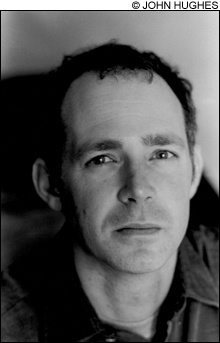
QUESTIONS OF TRUTH AND LOVE Brock Clarke engages. |
Reviewing Brock Clarke's last novel,
An Arsonist's Guide to Writers' Homes in New England (Algonquin), three years ago — before the author moved to Portland, started teaching at Bowdoin College, and released his new book,
Exley, which he'll read at Longfellow Books next week — I admired its mischievous streak, as a book ironically contemptuous of people who treat books and their authors as sacred objects, and which had great fun with its central question: "if a good story leads you to do bad things, can it be a good story after all?"
That phrase is never uttered in Exley, but the question is still appropriate. In the book, a precocious, speed-reading nine-year-old named Miller investigates his father's disappearance by, in part, scrutinizing dad's favorite book, Frederick Exley's "fictional memoir" A Fan's Notes. The book is treated with reverence by Miller's father: he owns multiple copies and models his speech after its profane, hard-drinking protagonist; it is, in fact, the only book Miller's father has read during Miller's life.
The whereabouts of Miller's father are up for debate: he tells Miller and his mother, Carrie, that he's gone to enlist in the army and fight in Iraq, and writes his son letters from the battlefield. Carrie cannot fathom the possibility, so Miller wonders if his father left her for another woman. Further complicating matters, Miller so desperately wants to believe his father is in the war that, on a hunch, he visits the VA hospital in his hometown of Watertown, New York, and is convinced that his father is there, comatose. Miller decides the only way to save his father is to track down Frederick Exley, who will surely rouse him from his slumber.
Meanwhile, Miller pays regular visits to a stuffy, unhelpful psychiatrist, whom Miller — in an effort to receive better counsel — renames and trains to ask more helpful questions. The doctor obeys all of Miller's demands, thanks to an ulterior motive: wooing the boy's mother.
Both Miller and his psychiatrist narrate the novel, and both prove unreliable protagonists: Miller is relentlessly speculative in his attempts to track down Exley and the truth of his father's abandonment, but is equally prone to delusion; his doctor, inspired by both Miller and, later, A Fan's Notes, eventually fancies himself a detective, employing shady tactics in order to both heal Miller and seduce Carrie.
Like An Arsonist's Guide, Exley is dense with plot twists (both serious and absurd) and with ideas of narrative authenticity, playfully tackling the questions raised by a muse like Exley's 1968 book: if we fudge the truth in the service of a good story, should the story be treated as truth at all? How do we still love others after we realize they're not who we thought they were?
Clarke seems more engaged with these questions than he was in An Arsonist's Guide; their thematic relevance has more gravity, both thanks to and in spite of Miller's narration, which owes too strong a debt to the protagonist of Jonathan Safran Foer's Extremely Loud and Incredibly Close, with his sometimes-profound, sometimes-precious observations and quirks in the face of tragic realities a child shouldn't have to stand up to. Miller's intelligence strains credulity, but it's difficult not to be both amused and touched as he likens a fight with his mother to one between "an old married couple: neither of us would admit we were wrong unless we were presented with proof that we were wrong."